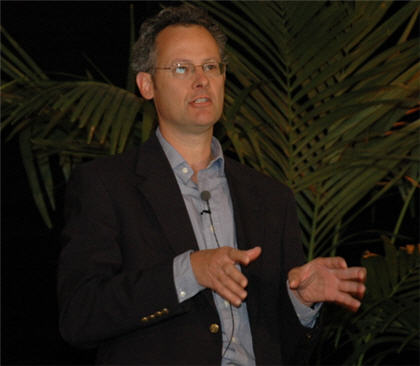Does Web 2.0 matter?

Nicholas Carr discussed the thesis of his forthcoming book, The Big Switch: Our New Digital Destiny, during the morning session at the Supernova 2007 Conference.
I am taking liberty with the title of Nick's previous book, Does IT Matter?.
He is not in any way suggesting that Web 2.o doesn't matter, but he places the Web 2.0 movement in the context of the larger canvas of utility computing covered in his new book.
Just as the electrical grid and socket transformed industry and society in the 20th century, Carr posits that the emergence of massive scale computing utilities and widely available, abundant computing power will be transformative in the 21st century. Centralized supply of computing power will bring enormous scale advantages, driving the price for services down.
"We are seeing now an enormous amount of capital investment in building out computing utilities. Google, Microsoft, salesforce.com on a smaller scale, Yahoo, Ask and Intuit are building massive central data processing plants to supply sophisticated applications, computing and storage over the network," Carr said.
Amazon, HP, Sun, IBM and many others will add their compute services and power plants to the grid.
In this utility computing context, the focus on Web 2.0 is short-sighted, Nick said. "Web 2.0 as concept is useful in getting people excited about the Internet, but it's also a filter on entrepreneurs," Carr said.
"We need to break free from the Web 2.0 world and the narrow innovation we see there. We will see business models far beyond giving away software for free and clicking on little ads. As with electricity, there will be an explosion of ideas and applications, which use cheap computing power in reconfiguring services and products in real and virtual worlds. We need to break free of the narrow blinders of the Internet itself and think about what to do with this socket that we have never had before."
I asked Nick what kind of applications and services the Big Switch would bring forth. In an email response after his presentation, Nick wrote:
It's very hard to imagine, in concrete terms, the products and services that will appear when an important resource becomes cheap and widely available. (That's why it's such a huge business opportunity.)
One example that interests me, though, is how this new computing utility will affect how electric utilities do business. We're already seeing smart, networked meters at the household level, which allow homeowners to track their power usage. That's going to bring a lot more precise pricing, by time of day, which will have lots of ripple effects.
Beyond that, though, I think we'll begin to see smart, networked sockets, which will give customers an understanding of usage and pricing at the appliance level. And that, in turn, will generate a huge amount of information on people's behavior at home, which will be very valuable to, say, appliance makers and other businesses and marketers. If the utility can harvest that information, it could open up important new information businesses. (On the other hand, utilities may be disintermediated by, say, Google.)
That gives a hypothetical sense of the ripple effects that can effect industries. It doesn't, though, illustrate what I think will be the most interesting opportunity: incorporating vast information-processing power into new devices and appliances. It's those applications that lie beyond my powers of imagination.
Brad Templeton of the Electronic Frontier Foundation asked during the Q&A period if centralized computing power takes control away from users. Carr responded that unlike electricity, which merely provides the power generation and current, computing utilities can supply applications and services. "There is more choice for individuals and companies of what they buy through the grid and what they run locally. It's a different kind of industry to electricity."
"Neither bandwidth or processing power is scare enough to need control, and users have choice," added Chris Meyer, CEO of Monitor Networks.
Utility computing, the "big switch" is an obvious technological evolution, but it won't be an overnight sensation. No flipping the big Webtone switch and everything is illuminated, but more of a gradual shift to the cloud over the next decade. For enterprises, it's partly cultural issue and one of retiring capital investments in infrastructure that most companies have invested in over the last decades and getting corporations more comfortable with the security, reliability and cost efficiencies of the computing utilities.
The Big Switch will be available in December.
